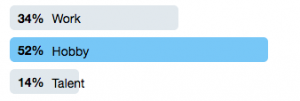This Week’s Bit of String: Solitary bowling
Last week my office had a bowling night out. While we cheered our mostly lacklustre shots over cheesy chips and a vast range of alcoholic beverages, an older couple set up a few lanes along.
Only the woman bowled. She wore a bright pink skirt, a lycra team t-shirt, and a grave expression. She’d brought wristbands and kneestraps. Her husband recorded her work with a handheld, flip-out camera, I assume so she could critique herself later.
Before each play she communed briefly with the ball, hugging it to her chest, contemplating the long lonely expanse she was about to cast it into. I’m not sure what goes down between a bowler and the ball in those split seconds. My workmates and I tried mantras like, ‘I am one with the ball and the ball is with me,’ none of which worked any magic.
The pink-skirted woman threw fast, powerful shots and toppled most if not all her pins. But her expression never changed. Though her dedication and force impressed me, I couldn’t shake the feeling she’d leave the alley deeply dissatisfied.
It’s great to pursue a sport or a hobby, whatever it is, any avenue of self-improvement. Probably for those of you reading this blog, writing qualifies as such a pursuit.
And chances are, like me, you’re not exactly earning a living from it. It’s the beast you feed your spare time to, before going to the office and after the kids are in bed. Those precious slices of our day get devoured by building word count on new projects, editing older pieces, managing a social media network, critiquing friends’ work, researching agents and publications, promoting our gigs and releases, reading and research.
It’s a bit like having a second full-time job, isn’t it?
Work, Hobby, or Talent?
To check how it is for others, I polled Twitter on which term best describes writing in the respondents’ lives: work, hobby, or talent. (I included a disclaimer: I understand these words aren’t mutually exclusive, but I wanted to see what other writers viewed as most accurate.)
A much larger percentage chose hobby to describe writing. A fair few selected work, and only a small number said talent, which is understandable. We may have talent for writing but the term is insufficiently indicative of the conscious effort required.
Looking at the etymology of these terms, the word hobby derives from the word hobbyhorse, and the use in Morris dancing. This affiliation with pretending to do something puts me off a little; it links a hobby with a substitute; something not fully real or functional.

Regardless of what your hobby is, it’s real to you and it does serve a function, even if that function is to escape reality. Articles such as this one from Very Well Mind abound on the importance of hobbies to cut down on stress—and, where necessary, to provide eustress, ‘the healthy kind of stress that we all need to remain feeling excited about life.’
We can probably agree there is stress involved in writing. Even for those not wishing to publish or share, I imagine they still struggle with developing their stories or poems enough to please themselves. The challenges involved here, I believe (admittedly without absence of bias), equip us with resilience and empathy in other areas of our lives.
Partly because of this stress, I join those categorising it as work, if not the most profitable kind and certainly not the most unpleasant. By treating writing as another job, this legitimises time spent on it and shields us from some (certainly not all) encroachments. It keeps our morsels of time out of other greedy mouths.
Consider the definitions of work, which according to etymonline.com all date back to old English, around the start of the thirteenth century.
- “To perform physical labor:” Well, mental labour certainly. And a bit of wrist strain on those rare occasions when the words are really flying over the keyboard.
- “To ply one’s trade:” Yes, somewhat. Possibly many of us consider ourselves writers above whatever we happen to do to earn the bulk of our income.
- “To exert creative power, be a creator.” Undoubtedly.
- Finally, my favourite: the transitive sense “manipulate (physical substances) into a desired state or form.” Disregard the parenthetical and you bet your boots we manipulate, we manipulate words into desired form.
For the Love of Art

Writing is also, of course, an art. I deliberately withheld that option from the Twitter poll, but I imagine most would agree. And art is perhaps a more encompassing term than hobby. Did you know the word’s Latin root artem/ars is related to arma, the Latin word for weapons?
We are bearers of weapons, folks.
As we go into battle, as we get down to work, as we utilise our talents and pour time into our hobbies aiming for self-betterment, let’s make sure we still love it. Let’s make sure our faces don’t sag into chronic frowns as we hammer out plots and contemplate rejection letters. I keep thinking of the woman in the bowling alley and how joyless she looked. If you worry about burnout, here are some links to previous inspiring posts:
- Maintaining pride in the face of rejection
- Coping with writing AND a full-time job
- Fuelling the imagination
- Our reasons for bothering with all this in the first place
So what do you think? Work, hobby, talent, art?





